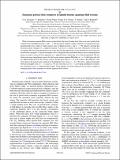Emergent particle-hole symmetry in spinful bosonic quantum Hall systems
Author(s)
Geraedts, S. D.; Repellin, C.; Wang, Chong; Mong, Roger S. K.; Regnault, N.; Senthil, T.; ... Show more Show less
DownloadPhysRevB.96.075148.pdf (1.048Mb)
PUBLISHER_POLICY
Publisher Policy
Article is made available in accordance with the publisher's policy and may be subject to US copyright law. Please refer to the publisher's site for terms of use.
Terms of use
Metadata
Show full item recordAbstract
When a fermionic quantum Hall system is projected into the lowest Landau level, there is an exact particle-hole symmetry between filling fractions ν and 1−ν. We investigate whether a similar symmetry can emerge in bosonic quantum Hall states, where it would connect states at filling fractions ν and 2−ν. We begin by showing that the particle-hole conjugate to a composite fermion “Jain state” is another Jain state, obtained by reverse flux attachment. We show how information such as the shift and the edge theory can be obtained for states which are particle-hole conjugates. Using the techniques of exact diagonalization and infinite density matrix renormalization group, we study a system of two-component (i.e., spinful) bosons, interacting via a δ-function potential. We first obtain real-space entanglement spectra for the bosonic integer quantum Hall effect at ν=2, which plays the role of a filled Landau level for the bosonic system. We then show that at ν=4/3 the system is described by a Jain state which is the particle-hole conjugate of the Halperin (221) state at ν=2/3. We show a similar relationship between nonsinglet states at ν=1/2 and 3/2. We also study the case of ν=1, providing unambiguous evidence that the ground state is a composite Fermi liquid. Taken together our results demonstrate that there is indeed an emergent particle-hole symmetry in bosonic quantum Hall systems.
Date issued
2017-08Department
Massachusetts Institute of Technology. Department of PhysicsJournal
Physical Review B
Publisher
American Physical Society
Citation
Geraedts, S. D. et al. "Emergent particle-hole symmetry in spinful bosonic quantum Hall systems." Physical Review B 96, 7 (August 2017): 075148 © 2017 American Physical Society
Version: Final published version
ISSN
2469-9950
2469-9969